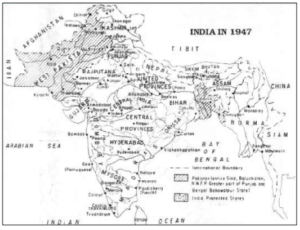Chapter – 7
Federalism
In this post, we have given the Important Questions of Class 11 Political Science Chapter 7 (Federalism) in English. These Important Questions are useful for the students who are going to appear in class 11 board exams.
| Board | CBSE Board, UP Board, JAC Board, Bihar Board, HBSE Board, UBSE Board, PSEB Board, RBSE Board |
| Textbook | NCERT |
| Class | Class 11 |
| Subject | Political Science |
| Chapter no. | Chapter 7 |
| Chapter Name | (Federalism) |
| Category | Class 11 Political Science Important Questions in English |
| Medium | English |
Chapter 7 Federalism
Very Short Answer.
Q1. Why was the federalism system adopted in India?
Ans. Due to immense diversity and large population
Q2. When was Sarkaria Commission created?
Ans. 1983
Q3. Write the name of anyone state related to Article 371?
Ans. Manipur
Q4. When was the State Reorganization Commission formed?
Ans. 1954
Q5. What does autonomy mean?
Ans. In its simplest sense, autonomy is about a person’s ability to act on his or her own values and interests. Taken from ancient Greek, the word means ‘self-legislation’ or ‘self-governance.
Two Marks Questions
Q1. In which state was Mysore and Madras merged?
Ans. Karnataka Tamil Nadu
Q2. How federalism helped unity in India’s diversity.
Ans. Central and State Governments own territorial rights
Q3. What does Article-1 indicate?
Ans. India is a union of states and centrally administered states
Q4. What is meant by division of power?
Ans. Division of executive powers, the legislature has its own jurisdiction over the judiciary, the Union State is its subject in the Concurrent List, which is made by the Central and State Governments
Q5. What are the residual powers?
Ans. A residuary power is a power retained by a governmental authority after certain powers have been delegated to other authorities.
- Residuary Powers are special powers entrusted by the Constitution, to the Union Government.
- The Parliament has powers to make any law with respect to any matter which is not a part of the Concurrent List or State List.
Q6. On what basis do states demand autonomy?
Ans. State autonomy demands language, income financial power administrative power.
Q7. What are the main provisions in Sarkaria Commission?
Ans. On the balance of power related to center state relations.
Q8. Give two examples of inter-state disputes?
Ans. Border dispute river water sharing dispute like Punjab, Haryana.
Q9. When and by whom was the Sarkaria Commission set up?
Ans. In June 1983 by Justice Rajendra Singh Sarkaria, retired Supreme Court Judge.
Four Marks Questions
Q1. What demands were raised in states in the desire for more autonomy?
Ans.
- River water sharing
- Border dispute demands new states
- Economic Financial Freedom Right to Resources
Q2. Name the four federal features of the Indian Constitution?
Ans.
- Division of powers
- Independent judiciary
- Bicameral legislature Constitution
Q3. State the four unitary features ofthe Indian Constitution?
Ans.
- Single Citizenship
- Highest near center
- Unified judiciary
- State is weak even financially
Q4. Why are many states not happy about the role of state governor?
Ans. Appointment by the President, Work for the Central Government, Right to impose President’s Rule, Dispute on making the law legal, Act as an agent of the Center.
Q5. Mention the provision of President’s rule in the state?
Ans. Article 356 In case of internal peace in the state, there is no crisis with the government if there is an economic crisis;
Five Marks Questions
Q1. Study the cartoon and answer the given questions

(a) How is the governor appointed?
Ans. By the President
(b) According to the cartoon, what does the appointment of the governor mean?
Ans. Whenever you want to make a governor, you can remove it or send it to another place.
(c) Is the Governor’s appointment always the same?
Ans. Yes, Governor is appointed by the will of the President and by the will of the Central Government
Q2. Look at the map carefully and answer the questions asked.

(a) Write the names of the four princely states on the 1947 map of India and state in which states they merged at the present time.
Ans.
Princely State State
- Rajputana Rajasthan
- Junagadh Gujarat
- Mysore Karnataka
- Madras Tamil Nadu
(b) Write the names of four states that were born as new states.
Ans. Uttarakhand, Jharkhand, Chhattisgarh, Telangana
(c) Write the name of a non-Hindi language state.
Ans. Andhra Pradesh, Tamil Nadu, Karnataka (Either)
Six Marks Questions
Q1. The constitution of the Indian Constitution is federal but in fact unitary features are effective.
Ans. Division of single citizenship powers. Emergency powers of the President. Use of Article 356 on the state, etc.
Q2. Describe Union List State List Concurrent List
Ans.
- Union List:- Subject of national importance in which there are about 98 subjects as soon as Defence, Foreign Affairs, Rail, Port, Bank, Minerals etc.
- State list:- Normally about 61 topics of regional importance like police, justice, local self-government agriculture, irrigation, health etc.
- Concurrent List: – There are about 52 topics like foreclosure law process social security etc.
Q3. What does autonomy and isolationism mean.
Ans.
- Getting more autonomy, separatism, discriminatory behaviour by central government.
- Non-interference of central government while working by state.
- In separatism, the central government does not provide financial assistance by the state government, does not make development related plans.
We hope that Class 11 Political Science Chapter 7 (Federalism) Important Questions in English helped you. If you have any queries about class 11 Political Science Chapter 7 (Federalism) Important Questions in English or about any other notes of class 11 Political Science in English, so you can comment below. We will reach you as soon as possible…


